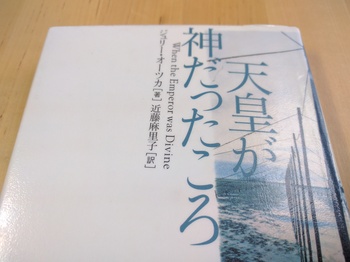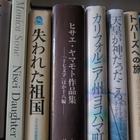I read in the news that a meeting was held recently at the Japanese American Association in New York to hear stories from survivors of the internment of Japanese Americans after the outbreak of the war between Japan and the United States, and the venue was packed with people, some of whom were standing, indicating the high level of interest. This may also be a reflection of the exclusionary immigration policies of the new Trump administration.
"When the Emperor Was a God" is a story by third-generation Japanese-American woman writer Julie Otsuka about a Japanese-American family's experiences during internment after the outbreak of war.
The original English title is "When the Emperor was Divine." The title reflects the fact that the Emperor was the sovereign of Japan and was deified, and that his existence and the relationship between the Emperor and the Japanese people were viewed as mysterious by Japanese Americans.
If you are Japanese, it would be difficult to use the word "Emperor" in the title of a novel. It is a heavy and delicate word. The only reason he can use it is because he is an American, even if he is of Japanese descent.
What is Japan, our roots? What does it mean to be Japanese? What kind of country is Japan, where the Emperor is treated like a god? Even though they are related by blood as Japanese people, the author seems to have felt that Japan was a faraway country.
Author Julie Otsuka was born in Palo Alto, California in 1962. Her father was a "Shin-Issei" (new first generation) immigrant to the United States after the war, and her mother was a second generation Japanese-American. She majored in art at Yale University and aspired to be an artist, but at the age of 30, she switched to being a writer.
In 2012, she won the PEN/Faulkner Award for her novel "The Buddha in the Attic," which tells the story of women who traveled from Japan to America as "picture brides" before the war.
Her first full-length novel, When the Emperor Was God, published in 2002, is based on the real-life experiences of her maternal family: her grandfather was arrested by the FBI immediately after the outbreak of war between Japan and the United States and held as an enemy alien until the end of the war, while her grandmother, mother, and uncle were detained for three and a half years at the Topaz internment camp in Utah.
The novel tells the story of a Japanese-American family from the beginning of the war to the end of the war. The father was intelligent and kind, and the family was wealthy and lived an American lifestyle, even employing a maid. However, when the war began, the father was probably judged to be pro-Japan, and was arrested, separated from his family, and sent to an internment camp for Japanese-Americans who were considered anti-American.
All that was left was the mother, the girl, and the boy. They rented out the house they were used to living in to someone else with uncertain promises, got rid of as much as they could, and packed up what they could take with them in preparation for the internment. They burned letters from Japan, burned family photos, and tore up the Japanese flag.
He strangles his pet chickens, speaks kindly to his old dog who he cannot take with him, and then buries him with a shovel over his head.
Did something like this actually happen, or was it just a plot device? I recall a story about Japanese settlers in Manchuria after the war who, in the panic that their women and children might be attacked by Soviet soldiers, killed their own compatriots. I wonder if there were ever such hysterical situations.
As scheduled, the three of them turned themselves in to the Civil Control Bureau, were given identification numbers, and, like the other Japanese Americans, were taken by train to their detention center. When they arrived at the detention center surrounded by barbed wire, their mother said,
"Never mention the Emperor's name"
Life in the camp is depicted in a straightforward manner through the seasons. Sometimes from the eyes of a boy, sometimes from the eyes of a girl or a mother. Occasionally, letters arrive from a father in another camp, and the boy reminisces about life before the war.
As life in the desert continues, the mother no longer cares about who is winning the war. However, the military asks the Japanese in the camps if they will pledge allegiance to America. To avoid being labeled as disloyal and causing trouble, the mother says "yes." However, she thinks that it is "all just words."
After the war ends, the family returns home from the internment camp. The atmosphere around them is uneasy. Soldiers who died fighting against Japan, soldiers who returned wounded. The barbaric acts of the Japanese army are remembered, and Japs are reviled as despicable. The Japanese family has to endure whatever is said, bow their heads and say "I'm sorry" to avoid friction with those around them as much as possible, and live in hiding.
The author writes about this seemingly servile way of behaving, but the reader gradually comes to understand that it is an expression of anger toward the injustice of things.
When the father returns, he is a changed man, housebound and unemployed due to the trauma of his detention, and the anger is further heightened by the father's confession at the end about his experiences after his arrest.
I'm a saboteur, a Jap, cunning, heartless, cruel, and concludes with, "I'm sorry."
Many first and second generation Japanese have endured their war experiences as something they could not avoid, and have hardly spoken about them to the next generation. When third and subsequent generations learn of these facts, they feel a renewed sense of anger, as if their dignity has been violated. This is, of course, because they are Japanese-Americans, but I cannot help but feel that it is also because of their strong sense of identity as Americans (nationals).
© 2017 Ryusuke Kawai







